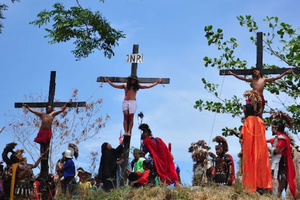The Eucharist Is the Source and Summit of Catholic Higher Education
COMMENTARY: In the light of the Blessed Sacrament, the purpose of higher education is not to help us achieve or consume, but to behold, ponder and become.

On the first evening of the National Eucharistic Congress, tens of thousands of pilgrims knelt in silence before the Blessed Sacrament in Lucas Oil Stadium in Indianapolis. In this arena typically filled with spectacle, there was silence. The Congress’ otherwise frenetic energy paused before the Eucharistic presence of Jesus Christ.
Despite the claims of many theologians (and some bishops), the rise of Eucharistic adoration has not been precipitated by a desire to return to pre-conciliar Eucharistic practice. Those who knelt before the Blessed Sacrament in Indianapolis attend reformed liturgies in their parishes. They’re happy to sing the Gloria in English, Spanish and Vietnamese. But they crave a space of stillness in an otherwise chaotic age.
A fruit of this National Eucharistic Revival, I suspect, is a recognition of the reason for this ressourcement of adoration. Pope Francis himself has urged us to return to this practice of sitting before Jesus in the Eucharist, letting our hearts be transformed through the presence of the Beloved.
And yet, it’s not only individuals that must be transformed. It is our institutional hearts, including those engaged in Catholic higher education. Such a transformation does not demand trading away the vocation of the Catholic college or university as an educational apostolate (more Masses, fewer classes). Rather, we must let a Eucharistic contemplative solitude heal the consumerist virus that has infected most of our institutions.
Education cannot be reduced to a consumer relationship, one where the student pays a certain amount of money and then we deliver the right amount of information in a timely fashion. The logic of efficiency, of rapidly delivering content (let’s put more classes online) so that our students can be prepared for careers, is one that leads not only to unhappiness but loneliness, anxiety and depression. As Catholic institutions of higher education compete ever more with cheaper public options, we have an opportunity to offer something different.
The purpose of higher education is not achievement. It is not consumption. Rather, the purpose is radically inefficient; as the Eucharist proposes to us, we are called to behold, ponder and become.
Behold: Taking Time to Look
If you’re looking for a spectacle, don’t turn to the Eucharist. The “almost” Catholic philosopher Simone Weil describes the Eucharist as the supremely excellent religious practice because, in beholding the Host, there is little to see. Unlike the spectacles of modernity (say, an NBA game), all there is to see is a thin, white piece of what looks like bread. Christ does not appear in a way that steals our freedom. We are invited to look, to wonder at this Host, freely seeing the gift that is given. And to offer ourselves in return.
Here is God’s own pedagogy, the educational philosophy that does not demand immediacy but a slow, contemplative beholding. In the Eucharist, there is more to see than we might immediately perceive. Bread isn’t bread — it’s the Person of Christ giving himself to us. It takes a lifetime to see this gift. And, therefore, we keep looking, slowing down before the Eucharist.
Such slow beholding is integral to every dimension of our education into the human condition, but it should especially mark the educational philosophy of Catholic higher education. If you’re attentive to the molecular structure of water, the physiology of a bird, the genius of a particular mathematical proof, a Jane Austen novel, or a question of the Summa, you’ll see more. There’s always more to see, and for that reason, we need to take time to behold and wonder at what is before us.
In his Education at the Crossroads, the Catholic philosopher Jacques Maritain argues that, in education, less is more. He argues this because the philosophical act always begins with this question: What is it? The student must slowly, even contemplatively, behold what is given in the educational encounter.
This goes against many of the practices in higher education today. We want students to move quickly into their major, not taking much time reading classic texts. We seek to find efficient ways of introducing content to students, forgetting that no educator can initiate the student into the work of beholding.
If we took the Eucharist seriously, as the heart of Catholic higher education, we’d need to slow down — to perceive what is so wondrous to behold.
Ponder: Taking Time to Think
To sit in silence before the Eucharist is rarely to be empty of all thought. As you pause before the Eucharistic Lord, your mental life is active. You think about your life, your friendships, all that troubles you. In that hour before the Host, you’re engaged in a sort of philosophical wonder: What is the meaning of this gift? What does it mean for me? For my vocation? For my family?
In a post-Enlightenment era, we tend to treat thinking as something abstract, as the work of “thinkers.” But our day is full of ponderings. We see a leaf blowing in the wind, and we wonder what kind of tree this leaf came from. We call up our calendar on our computers, wondering how to arrange our schedule in a way that allows us to pick up our children at 4 p.m. Human beings are always pondering. At our best, we’re thinking together, something that the philosophical tradition has called dialogue. Such dialogue can take place in solitude (as soliloquy) or in common.
But again, dialogue of both sorts takes time. And in our current educational milieu, we don’t have time for that dialogue. We’re encouraging students to use AI to get the meaning of a text as quickly as possible, foregoing the kind of slow reading and therefore pondering that is necessary to seek not only understanding but wisdom. Why come to class where you’re participating in conversation when you could just as easily (and more quickly) watch a video of the lecture after the fact? Why give assignments that require understanding, when it’s easier to deliver a Canvas multiple-choice quiz with nearly zero feedback?
The Eucharistic mystery is one that takes time to ponder. When we look upon the Eucharistic Lord, we do not immediately come to insight. Religious practice, such as adoration, often takes a lifetime to lead to insight. Years of dialogue with the Eucharistic Lord are needed to make sense of how we relate to this gift of love beyond all human telling.
The same is generally true of human thinking in general. We rarely grasp immediately the genius of Latin poetry or prose, the import of a particular novel for understanding the human condition, or the subtle way that God has entered human history in Scripture.
It all takes time, but our assessments are ordered toward immediacy: Did you understand what I said? Have you grasped enough of this that I feel comfortable passing you from this class and on to another professor’s course? To the next class in your major? And if you didn’t, c’est la vie. That’s the problem of the next professor.
It’s worth the time in college to think, to look at what lies before us, pondering the wisdom that is given. Our campuses, though, have become so over-programmed (join this club, study these three majors, and interview for 700 internships) that we don’t have time to think. To ponder.
Maybe, many of our institutions must recognize that teaching matters a good deal more than we realize. For the art of teaching takes time, as we initiate students (and ourselves as professors) in the work of slowly beholding and pondering alike.
Research alike, for the professors, takes time. Maybe we need another metric beyond the number of articles published in top-tiered journals, the number of books written; but instead, the quality of pondering engaged in by our students and professors alike.
Become: Falling in Love
When St. Augustine addresses the Eucharist, he tells his readers to become what they receive — that is, the Body of Christ. Such an exhortation for Augustine is not unique to the Eucharist. In sermons, he often tells his listeners to become the light that they behold, to become the hymn of praise they sing. In all these instances, it is not enough to behold and to understand, but to desire. We must let our lives be shaped by worship.
In Eucharistic adoration, our work of beholding is not complete until we become what we behold — the gift of Love poured out for the life of the world. This is the consequence of Eucharistic adoration; and as a vocation, it takes time. A parent doesn’t perfect his or her craft in a single moment. We must let our loves and desires be shaped over the course of a lifetime.
So, too, for the work of study. We want our students to become what they behold and ponder. In this case, they are not to become a mathematical proof or a book. Rather, we must become what we both behold and ponder: a wise person, a lover of the truth, an integral person who lets our lives be shaped by what we study.
Again, this takes time. It takes a certain kind of relationship between the student and the professor that is not reducible to a transaction: Professor gives information, student receives, then moves on. All education is necessarily formative, shaping our desires. For both professor and student alike, we are involved in the work of reforming our desires — what we love. All of this takes the sort of time that a consumerist model of education rebels against.
It is my hope that the Eucharistic Revival should influence campus life, initiating us into a contemplative, rather than consumerist, model of Catholic higher education. Our current approach is unsustainable, wreaking havoc upon the interior lives of professor and student alike. We have the potential to offer a truly Catholic education, worshipful and contemplative in orientation, one that heals the malaise of frenetic, late modernity. All we need is to remember the Eucharistic roots of our educational work, a worshipful wisdom grounded in the work of beholding, pondering and becoming.
Timothy P. O’Malley is the director of education at the McGrath Institute for Church Life at the University of Notre Dame.
















